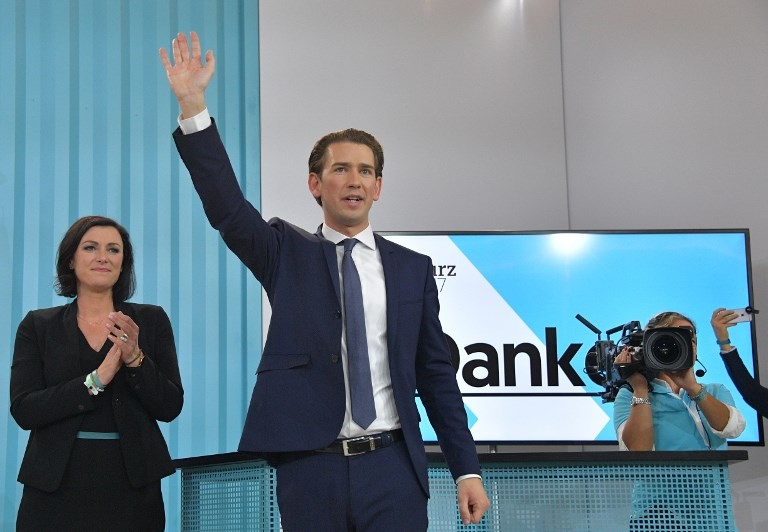Austria moves to right as anti-immigration star seals election win

Young anti-immigration campaigner Sebastian Kurz is on track to become Austria's next leader, projections of Sunday's parliamentary election result showed, but his party is far short of a majority and likely to seek a coalition with the resurgent far right.
By taking a hard line on immigration that left little daylight between him and the far-right Freedom Party (FPO), 31-year old Foreign Minister Kurz managed to propel his People's Party to first place and draw some support away from an FPO buoyed by Europe's migration crisis.
Both parties increased their share of the vote from the last parliamentary election in 2013, marking a sharp national shift to the right. Chancellor Christian Kern's Social Democrats were in a close race with the FPO for second place.
"It is our task to work with all others for our country," Kurz told his supporters, without revealing which way he was leaning on coalition talks.
As foreign minister, the rosy-cheeked Kurz claims credit for closing the Balkan migrant trail in 2016 that saw hundreds of thousands of migrants trek into Western Europe.
He wants to cut benefits for all foreigners, even from the rest of the EU, reduce bureaucracy and stop the EU having too much say in national affairs - in common with the FPO.
Austria, a wealthy country of 8.7 million people that stretches from Slovakia to Switzerland, was a gateway into Germany for more than 1 million people during the migration crisis that began in 2015. Many of them were fleeing war and poverty in the Middle East and elsewhere.
Austria also took in roughly 1 percent of its population in asylum seekers in 2015, one of the highest proportions on the continent. Many voters say the country was overrun.
Kurz's strategy of focusing on that issue appears to have paid off.
A projection by pollster SORA showed his People's Party (OVP) leading the election race with 31.6 percent of the vote, based on a count of 86.2 percent of non-postal ballots. Current coalition partners the Social Democrats were on 26.9 percent, just ahead of the FPO on 26.0 percent.
Shaking up Austria
The FPO was short of its record score of 26.9 percent, achieved in 1999, but still has a good chance of entering government for the first time in more than a decade. The OVP and the Social Democrats are at loggerheads, meaning the FPO is likely to be kingmaker.
FPO leader Heinz-Christian Strache, who has accused Kurz of stealing his party's ideas, declined to be drawn on his preferred partner.
"Anything is possible," he told ORF. "We are pleased with this great success and one thing is clear: nearly 60 percent of the Austrian population voted for the FPO programme."
Kurz, named party leader only in May, has been careful to keep his coalition options open, but he called an end to the current alliance with the Social Democrats, forcing Sunday's snap election. He has pledged to shake up Austrian politics, dominated for decades by coalitions between those two parties.
While that would suggest he will turn to the anti-Islam FPO, he has also said there could be leadership changes within the losing parties, a possible hint at being willing to work with the Social Democrats if Chancellor Christian Kern were ousted as leader by Defence Minister Hans Peter Doskozil.
New MEE newsletter: Jerusalem Dispatch
Sign up to get the latest insights and analysis on Israel-Palestine, alongside Turkey Unpacked and other MEE newsletters
Middle East Eye delivers independent and unrivalled coverage and analysis of the Middle East, North Africa and beyond. To learn more about republishing this content and the associated fees, please fill out this form. More about MEE can be found here.




